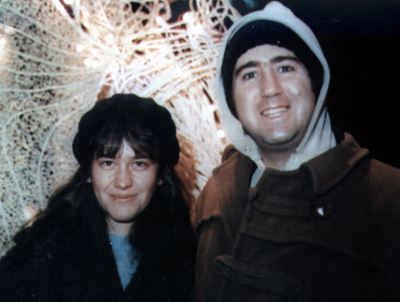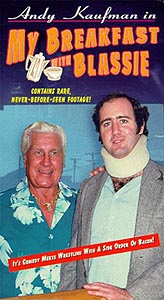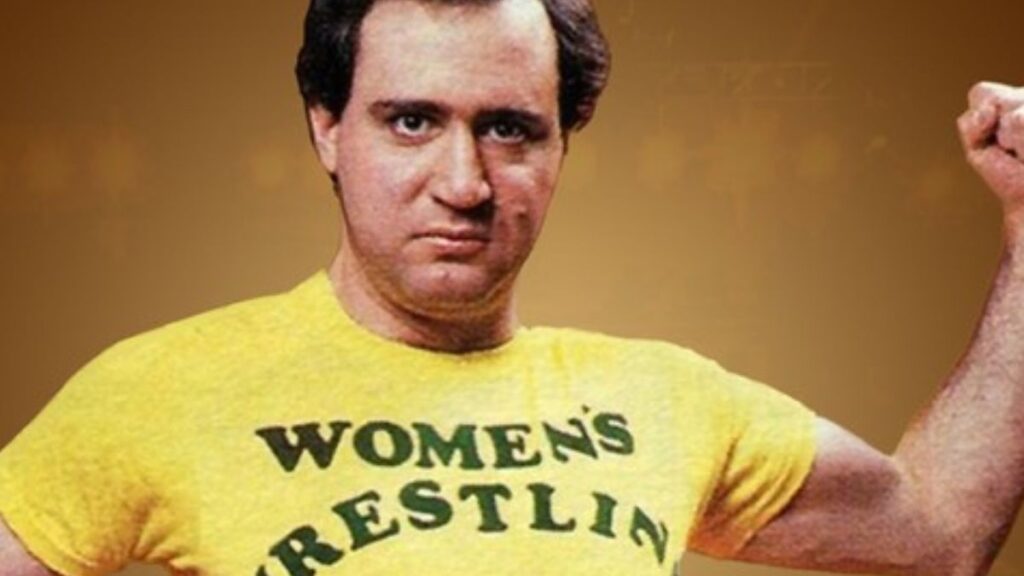In celebration of the 35th anniversary of Andy Kaufman and Jerry Lawler’s appearance on Late Night with David Letterman, SLAM! Wrestling looks back on Kaufman’s wrestling career with the person who was there for almost all of it, Lynne Margulies.
LYNNE’S EARLY YEARS
Though she was never directly involved in professional wrestling, it has hovered around Lynne Margulies for most of her life.
Growing up outside of Los Angeles, Margulies was introduced to wrestling at an early age by her older brother, Johnny Legend. Legend was a regular attendee of wrestling matches at Los Angeles’s Olympic Auditorium and took Margulies to her first match at age four. KTLA’s Wednesday evening wrestling broadcast was a fixture on their home television, and wrestler and actor Tor Johnson was a neighbor (Legend wrote about his friendship with Johnson in a piece called “I Remember Tor” for Fangoria magazine).
As a child, she also met Fred Blassie, who was one of the stars of the Los Angeles promotion. “It’s astounding how Fred Blassie could just go on and on, and twist the words up into these beautiful, wonderful sentences,” Margulies recalled for SLAM! Wrestling. “The arrogance and insulting people. When you think about it, there’s not really anybody of that caliber later on.”
Legend later introduced her to photographer Theo Ehret. When he wasn’t shooting boxing and wrestling at the Olympic, Ehret was providing images for the Apartment Wrestling series featured in Stanley Weston’s Sports Review Wrestling magazine, and Margulies appeared in several. “I would go to Theo’s and pose and get my 50 bucks,” she remembered. “It was good, clean, honest work for a 19 or 20 year old girl.”

Lynn and Andy.
In her early twenties, Margulies left Los Angeles to live in the woods of Northern California. She returned to appear as an extra in a film her brother was directing, My Breakfast with Blassie. It was conceived as a satire of Louis Malle’s My Dinner With Andre and Legend had convinced Taxi star Andy Kaufman to star opposite Fred Blassie.

My Breakfast With Blassie
The plan called for Kaufman and Blassie to improvise a conversation over breakfast at Los Angeles’s Sambo’s diner. Margulies and her three friends were seated at the next table and when Kaufman unexpectedly introduces himself to Margulies in the film, it was the actual first meeting between the two. She tells him she’s married to an inmate at Sing Sing and as she walks away, Kaufman stage whispers to Blassie, “I’m terrible with names.” “Just remember,” Blassie says back, “she’s the one with the legs.” The onscreen run-in kicked off a relationship that lasted until Kaufman’s death in 1984.At the time of filming, Kaufman was only a few weeks off of his first professional wrestling match and was barely a week off of an appearance with Jerry Lawler on Late Night with David Letterman. The episode made national headlines when Lawler slapped Kaufman out of his chair during an argument. Still, of the two actors in the film, Margulies had only heard of Blassie. “I didn’t know who [Andy Kaufman] was. I didn’t watch TV. I had no idea.”
ANDY ALWAYS DREAMED OF WRESTLING
When Margulies met Kaufman, he had already been wrestling women on television and in nightclubs for several years. Kaufman was a life-long wrestling fan, idolizing both Blassie and, in particular, Buddy Rogers. (A 14-year old Kaufman is said to have been in attendance at Madison Square Garden the night Rogers lost the WWWF title to Bruno Sammartino, a night Kaufman would remember as “the saddest night of my life.”) When Kaufman wrestled on the Saturday Night Live 1979 Christmas Special, Rogers appeared as his manager. “He grew up watching Buddy Rogers and then because he was famous, he could actually get him to be his manager on Saturday Night Live,” said Margulies. “I mean, that would be like meeting Elvis. It was his absolute dream.”
By all accounts, almost all of Kaufman’s matches with women were legitimate. After being turned down by the WWWF when he tried to perform the act at Madison Square Garden, he turned to Jerry Jarrett’s Memphis promotion through a connection with Weston-magazine writer and photographer Bill Apter. Kaufman wrestled women twice at the Mid-South Coliseum in 1981, the second match a set-up for a feud with Jerry Lawler.
Kaufman’s professional career began on April 5, 1982, in front of 8,000 fans. Lawler gave him a backdrop that legitimately knocked Kaufman silly and then dropped him on his head twice. When Kaufman showed footage of the match on Saturday Night Live in May of 1982, he vowed to never wrestle again. As a guest on The Merv Griffin Show in June, guest host Orson Welles asked Kaufman why he bothered wrestling at all; “I always liked wrestling, until this happened,” Kaufman replied, pointing to his prop neckbrace. “And now I don’t like it anymore”
“The importance to Memphis, and it is the most important match in my opinion, is that the next night the national news was showing Lawler piledriving Andy Kaufman,” remembered Memphis historian Mark James. “The last time a NWA champion had come to Memphis was December 1977, [Harley] Race versus Lawler. July 28th was when Lawler went on David Letterman. In 10 days, guess who showed up on Memphis Saturday morning TV? Ric Flair, and he fought Lawler. Memphis was hot.”
In January of 1983 Kaufman reneged on his promise to stay away from wrestling, interfering in a championship match between Jerry Lawler and AWA champion Nick Bockwinkel. Kaufman would appear at the Mid-South Coliseum eight times over the course of the year. Margulies traveled along for all of his appearances.
HERE’S A LITTLE AGIT FOR THE NEVER-BELIEVER
Throughout 1983, Kaufman became a fixture in the Memphis territory and on Memphis television. The atmosphere in the WMC studio, as Margulies remembers it, was like a playland. “It’s this lovely innocence,” she said, “like little kids. Even the adults were like little kids. And the audience was like little kids. I think that’s a lot of what attracted Andy, because he really liked to retain everything about childhood and have fun like a kid.”
Kaufman’s time in Memphis centered on his obsession with destroying Jerry Lawler. “I won’t stop until I find someone who’s going to put Jerry Lawler into the hospital, just like he did me,” Kaufman told announcer Lance Russell. “And it won’t be for any three days. It won’t be for a week. It will be for a month. Maybe for a year.”
Taxi
Like his idol Buddy Rogers, Kaufman had a talent for picking fights that fans were eager to see him not be able to finish. Kaufman’s dream, Lawler would later write in his autobiography, was to “wrestle as a bad guy and feel the reaction.” After one match at the Coliseum, a car followed Margulies and Kaufman out of the parking lot. They drove straight to the Memphis police station, causing the driver of the other car to pull away. “He did not want to end up on some dark road with whoever was in that car,” Margulies said.”For him to go to Memphis was as important as, say, make a movie for Universal Studios,” said Margulies. “There was no difference between the two in his mind. In fact, I would say going to Memphis to do the wrestling was more important than Taxi or anything else he could have been doing. He wanted to be a professional wrestler and this was the only way he could get into the wrestling arena. They let him into Memphis. They wouldn’t let him into New York.”
“I think Andy fell in love with [wrestling] because in what other theatre do you get that kind of reaction where the people suspend disbelief so much, to the point that they physically come after you or want to see you permanently disabled or maybe even killed?” said Memphis wrestling historian Scott Bowden.
Lynne, Andy and I’m From Hollywood co-director Joe Orr.
He wrestled at the Coliseum in May as part of a tag team with the Colossus of Death (Duke Myers). In July he was both a partner and opponent for Jimmy Hart. In November, he was wearing boxing gloves into the ring for matches against Jerry Lawler. Attendance for his final match was just over 3,000 people. “Back then, [Kaufman] had a ton of heat,” remembered Jim Cornette, who photographed the first Kaufman-Lawler match from ringside. “[Kaufman] got effortless heat because the people believed he was really a Hollywood TV star who was mocking them for not bathing. He was believable. So they hated him, and they threw things at him, but nobody thought he was going to whip Lawler, or win the title, or that it was going to be a great match.”
Kaufman’s acting career was struggling at this point, as well. In April 1983, Teaneck Tanzi: The Venus Flytrap, a wrestling-themed play he starred-in along with Blondie singer Debbie Harry, closed after a single Broadway performance. In June, the final episode of Taxi aired. “I remember we were in San Francisco,” said Margulies, “and talking about how, you know, no one would hire him anymore. He couldn’t get work anywhere, and he said, ‘I guess I’m just a writer now and maybe I’ll be a wrestling manager.’ That was his thought, that he would be a wrestling manager. It was his blood. He loved it. If he could have done it for the rest of his life I’m sure he would have been very happy.”
Andy and Lynne on the set of My Breakfast with Blassie
“I’VE GOT THE BRAINS. I’M FROM HOLLYWOOD.”
While Kaufman’s wrestling career has now become a part of wrestling lore, in 1983, few people outside of Tennessee were aware of anything he’d done since his 1982 appearance David Letterman with Jerry Lawler.
Towards the end of the year, Kaufman, Margulies, and Margulies’s directing partner Joe Orr began laying out what would become the film, I’m From Hollywood. Planned as a spoof documentary, Margulies was to play a filmmaker tracking down a reclusive Kaufman. “I finally find Andy and he’s living in this slovenly hole in the Tenderloin in San Francisco because his career is totally on the skids and he’s gone nuts,” she said. “So I’m From Hollywood was going to be wrapped around him telling the story of what happened in Memphis and then the end shot was going to be … what he really wanted was a helicopter shot where he’s standing out in the middle of the Tenderloin screaming, ‘I am not insane,’ and we pull back and he’s standing on the streets of Hollywood screaming. That was the original intention.”
Before filming could begin, Kaufman began treatment for lung cancer. In March of 1984, My Breakfast with Blassie premiered in Westwood, California. Immediately following the screening, Margulies and Kaufman travelled to the Philippines with hopes for a last-ditch miracle treatment. In May, Kaufman and Margulies returned to America, where Kaufman died on May 16th. At his funeral two days later, the Kaufman family invited Fred Blassie to sit with them for the service. “I was balling through the whole thing,” remembered Margulies, “and Freddy kept his arm around me to comfort me.”
“In the short time I knew him, we raised holy hell together,” wrote Blassie in his autobiography. “There was nothing I couldn’t do with Andy.”
Andy and Lynne in Bagiuo, Philippines, near the end of his life.
Following Kaufman’s death, Margulies continued work on I’m From Hollywood, following through on her promise to Kaufman to finish the film. “The main thing is he wanted to get that stuff out into the world because no one had seen it,” she said, “and before he died, that was the one thing I promised him. He said, ‘Promise me you’ll get the wrestling film out there so people can see.’ He was very proud of it. I think he thought it was the apex of his career, probably.”
The film was released on video in 1989, and was played frequently on Comedy Central in the late ’90s. It’s become the essential document of Kaufman’s wrestling career. “If you think about it, back then in the ’80s, wrestling wasn’t on cable. Local Memphis wrestling wasn’t shown anywhere but in [Tennessee]. So no one knew Andy did this, no one knew he did any of it. That’s why he wanted to make the documentary, because no one else knew what he was doing down there. It was totally isolated. It was just local wrestling.”
MISTER ANDY KAUFMAN’S GONE WRESTLING
Margulies consulted on Man on the Moon, the 1999 biopic of Kaufman that starred Jim Carrey (Margulies is portrayed by Courtney Love). The film featured re-enactments of both the initial Lawler-Kaufman match in 1982, as well as their appearance on Late Night with David Letterman. In 2009, she worked on the release of Dear Andy Kaufman, I Hate Your Guts!, a collection of the letters and photographs Kaufman received from women enraged by his wrestling persona.
A recent shot of Lynne Margulies.
Margulies has had a wide-ranging career, producing TV commercials, working as a director, editor, and videographer for Bob Zmuda’s charity “Comic Relief,” earning a degree in art, and co-authoring with Zmuda, Andy Kaufman: The Truth, Finally, the 2014 book on Kaufman’s life. She is now married and lives on the Oregon Coast, teaching art at San Francisco’s Academy of Art University.
For wrestling fans, the question of what Kaufman might have done, had he lived, is a tantalizing one to ask. Vince McMahon Jr. would certainly have been more responsive to working with Kaufman than his father had been. It’s not hard to imagine Kaufman having a large role at the first WrestleMania in 1985, and it’s fun to guess at how far he might have taken things on such a large stage.
As it stands, his time in Memphis has come to feel almost like a period near the end of a story about wrestling before its modern-era, and Kaufman fans still question what possibly drove an actor at the height of fame to go to the lengths Kaufman did to chase wrestling. It’s likely no one knows the answer to the question better than the person who was alongside him for almost his entire professional wrestling career and was responsible for documenting it for future fans. “When you know his career, you question, ‘Why on earth would he do this?'” said Margulies. “The real reason is just because he loved wrestling.”
ANDY KAUFMAN STORIES
- Oct. 7, 2024: Kayfabe lives again at rare screening of Kaufman’s ‘I’m From Hollywood’
- Oct. 12, 2022: The King and the comedian featured on this week’s ‘Tales from the Territories’
- Feb. 11, 2018: Kaufman’s wrestling days well illustrated by Box Brown
- July 2, 2016: Carrey’s ‘Man On The Moon’ a reminder of Kaufman’s genius
FREDDIE BLASSIE STORIES
- June 5, 2003: My Breakfast with Blassie: An appreciation
- June 2, 2003: Freddie Blassie passes away
- May 13, 2003: Blassie book bloody good read
- Oct. 26, 1998: Blassie toast of Cauliflower Alley Club
